Unit 4 sharing Reading and thinking Reading and Thinking 课件(共25张,内嵌音视频)
文档属性
| 名称 | Unit 4 sharing Reading and thinking Reading and Thinking 课件(共25张,内嵌音视频) | 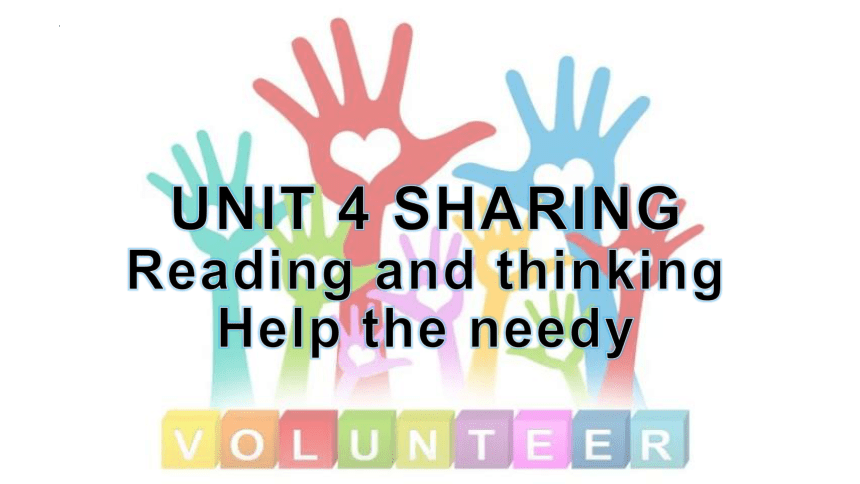 | |
| 格式 | pptx | ||
| 文件大小 | 86.7MB | ||
| 资源类型 | 教案 | ||
| 版本资源 | 人教版(2019) | ||
| 科目 | 英语 | ||
| 更新时间 | 2025-07-05 11:08:37 | ||
图片预览

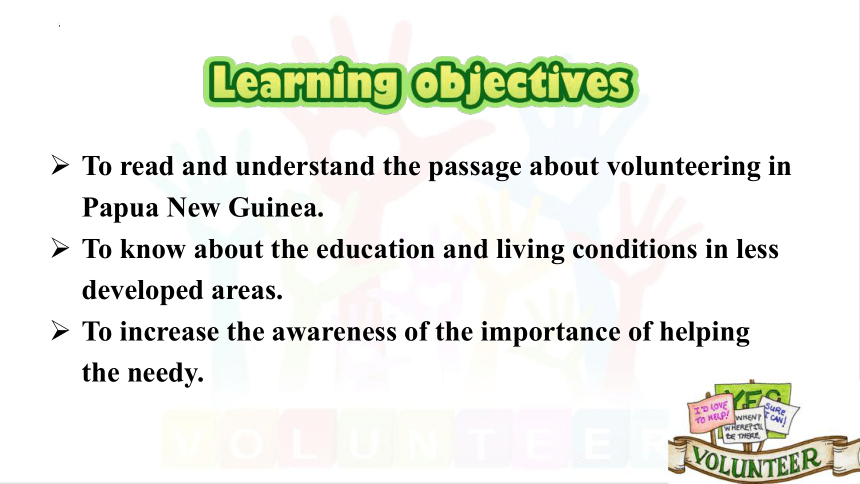
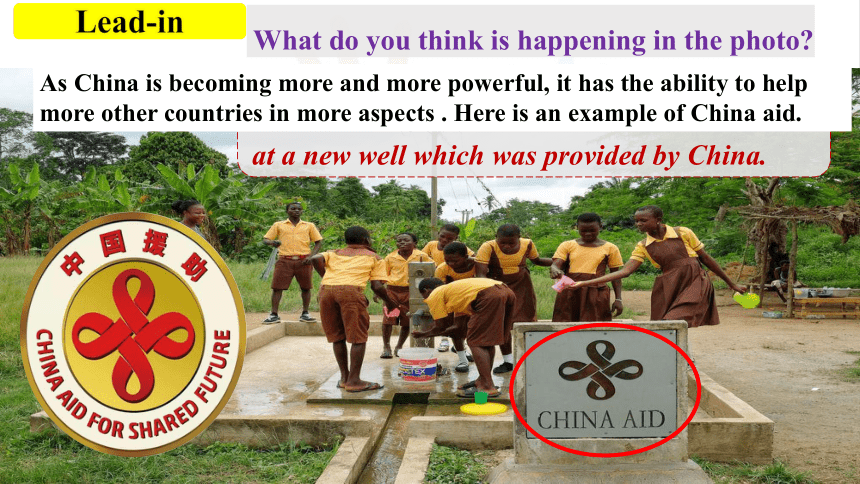
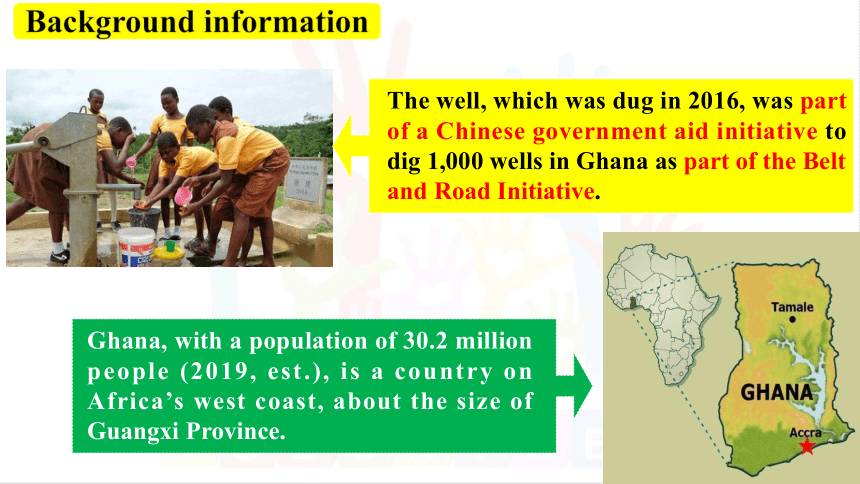
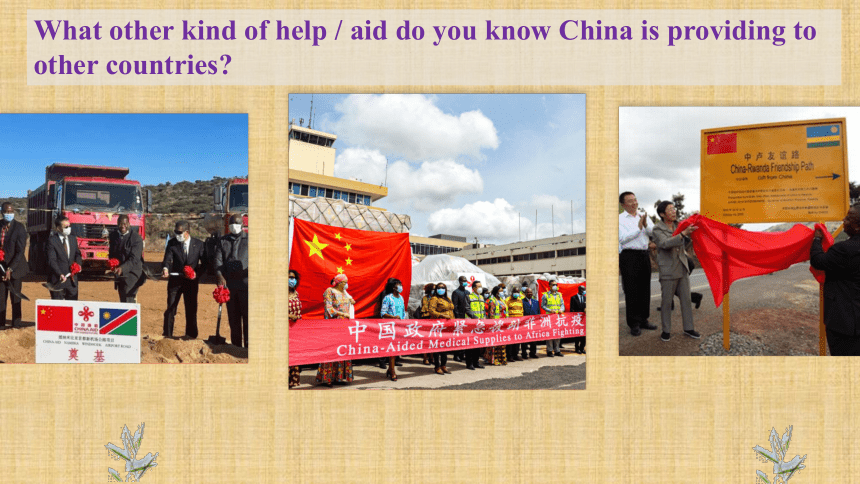

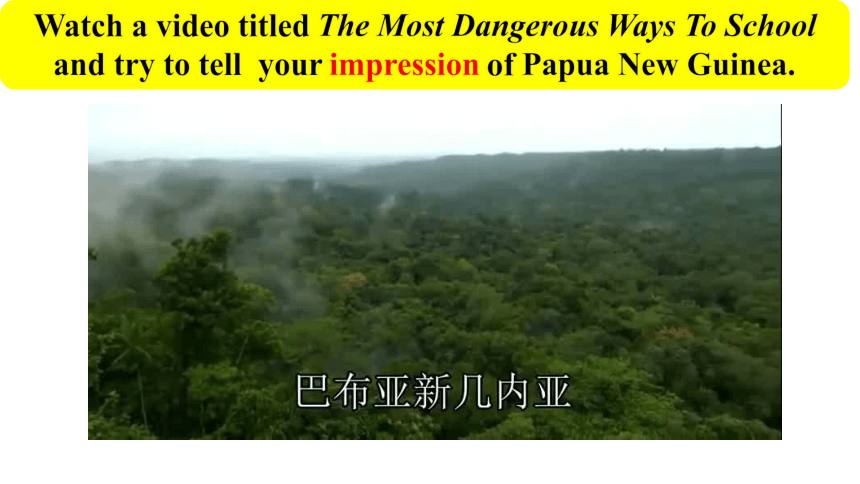
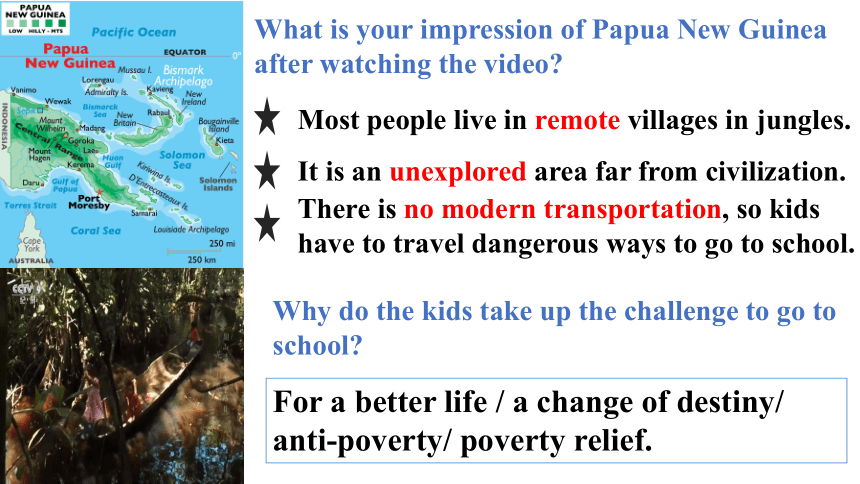
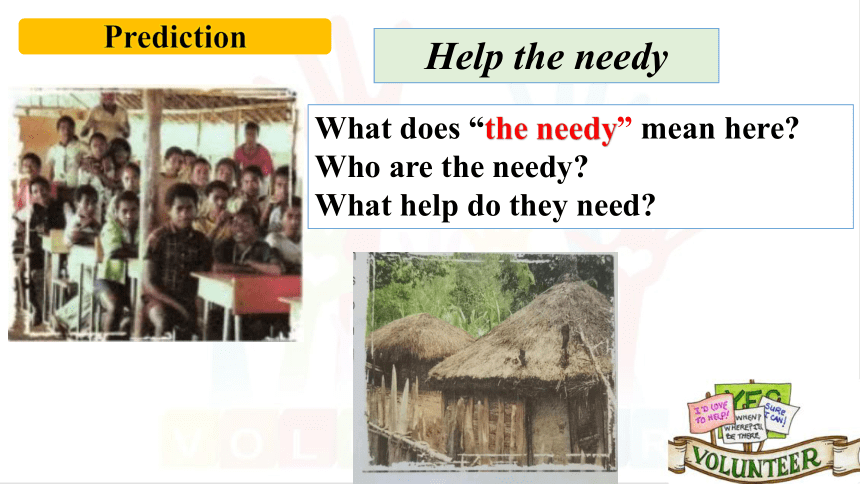
文档简介
(共25张PPT)
UNIT 4 SHARING
Reading and thinking
Help the needy
To read and understand the passage about volunteering in Papua New Guinea.
To know about the education and living conditions in less developed areas.
To increase the awareness of the importance of helping the needy.
Lead-in
What do you think is happening in the photo
Some young people in Africa are enjoying water at a new well which was provided by China.
As China is becoming more and more powerful, it has the ability to help more other countries in more aspects . Here is an example of China aid.
Background information
The well, which was dug in 2016, was part of a Chinese government aid initiative to dig 1,000 wells in Ghana as part of the Belt and Road Initiative.
Ghana, with a population of 30.2 million people (2019, est.), is a country on Africa’s west coast, about the size of Guangxi Province.
What other kind of help / aid do you know China is providing to other countries
As you grow older, you will discover that you have two hands, one for helping yourself, the other for helping others.
—Sam Levenson
How do you understand this quote
In context, the quote means that we should take care of ourselves, and that we should take care of others in an equal fashion.
Watch a video titled The Most Dangerous Ways To School and try to tell your impression of Papua New Guinea.
What is your impression of Papua New Guinea after watching the video
Most people live in remote villages in jungles.
It is an unexplored area far from civilization.
There is no modern transportation, so kids
have to travel dangerous ways to go to school.
Why do the kids take up the challenge to go to school
For a better life / a change of destiny/
anti-poverty/ poverty relief.
Prediction
What does “the needy” mean here
Who are the needy
What help do they need
Help the needy
A young Australian, Jo, worked for two years as a volunteer teacher in Papua New Guinea. What challenges do you think she might have faced
Eating
living conditions
language
transportation
customs
Prediction
Let’s read the passage on P38-39 to find out more information about Jo’s life as a volunteer teacher in Papua New Guinea
Skim
Skimming
Understanding of the title and text type
what is the type of the text
A blog with two entries.
wild country that has not been cleared, especially in Australia or Africa
Visiting Tombe’s home
Teaching in a bush school
Para. 1:
C. The author’s feeling after visiting the village
B. Jo received a parcel from home
A. What the author witnessed in Tombe’s village
D. The conditions about the bush school and
the challenges Jo has to be faced with
Para. 2-3:
Para. 5-7:
Para. 8:
Listen to the text and match the main idea with each part.
Para. 4:
E. How Jo got to Tombe’s home
Fast reading
Skim
Detailed reading
1. How did Jo feel when receiving the parcel from home
She was happy / delighted / excited to receive the parcel.
be dying to do 渴望做某事
2. Why did Jo feel that way
Because she was expecting the parcel and eager to receive it. It reflects the inconvenience of transportation and express delivery, as well as the lack of essential supplies.
Para 1
Jo received a parcel from home
Skim
Detailed reading
Para2. The conditions about the bush school
1. What does the school look like
2. How does the students impress Jo
They are so friendly but have poor living conditions.
The poor learning condition
The poor living condition
Friendly
Para 3
challenges Jo has been facing
What they have What they haven’t
running water
textbooks
modern devices
washroom
equipment for experiments
electricity
rubbers
paper
pencils
basic
facilities
learning
equipment
writing
materials
limited education resources
students’ eagerness to be educated
contrast
contrast
Detailed reading
Destination ________’s home——a ________ village
Companion
Distance ___________________’s walk: first, up a _________, then down a _______ path
Reception _____ cried “ _________ ”
_____________ with all villagers
everyone seemed to be __________ Tombe
Tombe
remote
Jenny
two and a half hours
mountain
shaded
Kiak
ieee ieee
shook hands
related to
Para 4
How Jo got to Tombe’s home
They lead a ________ life.
hospitable
Detailed reading
Types of houses
Sleeping arrangements
Possessions
Diet
Cooking methods
Living conditions
Eating culture
A low round bamboo hut with grass sticking out of the roof
one broom, a few saucers, a kettle, cups,pans and a couple of jars
Kau kau(sweet potato),
corn and greens
Placing hot stones in an
empty oil drum with food to steam
They believe that any leftovers attract bad spirits in the night.
Beliefs
Fresh grass had been laid on the floor and there was a platform for us to sleep on.
Para 5-7
What Jo has witnessed in Tombe’s village
poor
simple
Hospitable !
What did Jo feel after she left the village
My muscles were aching and my knees shaking as we dragged ourselves down the mountain towards home. That evening I fell happily into bed. It was such a privilege to have spent a day with Tombe's family.
physically exhausted
mentally satisfied
Para 8
Jo’s feeling after visiting the village
It is worthwhile to work as an volunteer.
Positive aspect
Negative aspect
The students value education
Able to get mail
Take only a few minutes to walk to school
The students are friendly
Fantastic scenery
Nice people
Interesting culture
No running water or electricity
The students have no concept of doing experiments
No washroom
The students may not be able to use what they have learnt
Have to walk a long distance to go anywhere
No beds, few possessions
Volunteering in the bush
Circle the positive and negative aspects of Jo’s voluntary in the bush.
Summarize the change of Jo's feelings
excited
happy
discouraging
doubtful
interested
enjoyable
exhausted
happy
worthwhile
receiving the parcel
teaching
science
greeted by her students
visiting Tombe's home
after the visit
What makes the change
cultural shock
a
d
j
u
s
t
m
e
n
t
Group Discussion
1. Jo felt it was a privilege to have spent a day with Tombe’s family.
If you were Jo, how do you think you would have felt Why
2. What are the differences between the school you go to and the one
described in the passage
3. Would you like to become a volunteer teacher Why or why not
1. Jo felt it was a privilege to have spent a day with Tombe’s family. If you
were Jo, how do you think you would have felt Why
2. What are the differences between the school you go to and the one described
in the passage
3. Would you like to become a volunteer teacher Why or why not
I would have felt privileged as well, as it was a rare chance to glimpse into another culture that most people will never have.
I go to a school that has all the conveniences of modern society, so there is no comparison at all. We have plenty of equipment and supplies, comfortable chairs, air conditioning, computers, etc.
I think it would be interesting to do that for a while. It would be a good opportunity to make a difference to someone else's life, and also to learn about a new culture.
Summary
VOLUNTEERING IN THE BUSH
At the bush school
At Tombe’s home
Teaching environment
Teaching materials
Students
Living conditions
Cooking methods
Dealing with leftovers
disappointed, sad, worried, doubtful
happy, satisfied, worthwhile
Change
Summary
help the needy 帮助有需要的人 2. face challenges 面对挑战
3. compare sth. with sb. 与某人比较某物 4. get the most out of 好好利用
5. be dying to do sth. 渴望做某事 6. secondary school 中学
7. be made of 由……制成 8. a chorus of 齐声;异口同声
9. up to sth. 到达(某数量等) 10. not to mention 更不用说
11. adapt to 适应 12. have no concept of 没有...概念
13. be rigid about 对……严苛 e across 遇见;发现
15. be relevant to 与……相关 16. to be honest老实说;说实话
17. make a difference to 对…有影响 18. have fantastic views美妙的风景
Useful phrases
thanks!
UNIT 4 SHARING
Reading and thinking
Help the needy
To read and understand the passage about volunteering in Papua New Guinea.
To know about the education and living conditions in less developed areas.
To increase the awareness of the importance of helping the needy.
Lead-in
What do you think is happening in the photo
Some young people in Africa are enjoying water at a new well which was provided by China.
As China is becoming more and more powerful, it has the ability to help more other countries in more aspects . Here is an example of China aid.
Background information
The well, which was dug in 2016, was part of a Chinese government aid initiative to dig 1,000 wells in Ghana as part of the Belt and Road Initiative.
Ghana, with a population of 30.2 million people (2019, est.), is a country on Africa’s west coast, about the size of Guangxi Province.
What other kind of help / aid do you know China is providing to other countries
As you grow older, you will discover that you have two hands, one for helping yourself, the other for helping others.
—Sam Levenson
How do you understand this quote
In context, the quote means that we should take care of ourselves, and that we should take care of others in an equal fashion.
Watch a video titled The Most Dangerous Ways To School and try to tell your impression of Papua New Guinea.
What is your impression of Papua New Guinea after watching the video
Most people live in remote villages in jungles.
It is an unexplored area far from civilization.
There is no modern transportation, so kids
have to travel dangerous ways to go to school.
Why do the kids take up the challenge to go to school
For a better life / a change of destiny/
anti-poverty/ poverty relief.
Prediction
What does “the needy” mean here
Who are the needy
What help do they need
Help the needy
A young Australian, Jo, worked for two years as a volunteer teacher in Papua New Guinea. What challenges do you think she might have faced
Eating
living conditions
language
transportation
customs
Prediction
Let’s read the passage on P38-39 to find out more information about Jo’s life as a volunteer teacher in Papua New Guinea
Skim
Skimming
Understanding of the title and text type
what is the type of the text
A blog with two entries.
wild country that has not been cleared, especially in Australia or Africa
Visiting Tombe’s home
Teaching in a bush school
Para. 1:
C. The author’s feeling after visiting the village
B. Jo received a parcel from home
A. What the author witnessed in Tombe’s village
D. The conditions about the bush school and
the challenges Jo has to be faced with
Para. 2-3:
Para. 5-7:
Para. 8:
Listen to the text and match the main idea with each part.
Para. 4:
E. How Jo got to Tombe’s home
Fast reading
Skim
Detailed reading
1. How did Jo feel when receiving the parcel from home
She was happy / delighted / excited to receive the parcel.
be dying to do 渴望做某事
2. Why did Jo feel that way
Because she was expecting the parcel and eager to receive it. It reflects the inconvenience of transportation and express delivery, as well as the lack of essential supplies.
Para 1
Jo received a parcel from home
Skim
Detailed reading
Para2. The conditions about the bush school
1. What does the school look like
2. How does the students impress Jo
They are so friendly but have poor living conditions.
The poor learning condition
The poor living condition
Friendly
Para 3
challenges Jo has been facing
What they have What they haven’t
running water
textbooks
modern devices
washroom
equipment for experiments
electricity
rubbers
paper
pencils
basic
facilities
learning
equipment
writing
materials
limited education resources
students’ eagerness to be educated
contrast
contrast
Detailed reading
Destination ________’s home——a ________ village
Companion
Distance ___________________’s walk: first, up a _________, then down a _______ path
Reception _____ cried “ _________ ”
_____________ with all villagers
everyone seemed to be __________ Tombe
Tombe
remote
Jenny
two and a half hours
mountain
shaded
Kiak
ieee ieee
shook hands
related to
Para 4
How Jo got to Tombe’s home
They lead a ________ life.
hospitable
Detailed reading
Types of houses
Sleeping arrangements
Possessions
Diet
Cooking methods
Living conditions
Eating culture
A low round bamboo hut with grass sticking out of the roof
one broom, a few saucers, a kettle, cups,pans and a couple of jars
Kau kau(sweet potato),
corn and greens
Placing hot stones in an
empty oil drum with food to steam
They believe that any leftovers attract bad spirits in the night.
Beliefs
Fresh grass had been laid on the floor and there was a platform for us to sleep on.
Para 5-7
What Jo has witnessed in Tombe’s village
poor
simple
Hospitable !
What did Jo feel after she left the village
My muscles were aching and my knees shaking as we dragged ourselves down the mountain towards home. That evening I fell happily into bed. It was such a privilege to have spent a day with Tombe's family.
physically exhausted
mentally satisfied
Para 8
Jo’s feeling after visiting the village
It is worthwhile to work as an volunteer.
Positive aspect
Negative aspect
The students value education
Able to get mail
Take only a few minutes to walk to school
The students are friendly
Fantastic scenery
Nice people
Interesting culture
No running water or electricity
The students have no concept of doing experiments
No washroom
The students may not be able to use what they have learnt
Have to walk a long distance to go anywhere
No beds, few possessions
Volunteering in the bush
Circle the positive and negative aspects of Jo’s voluntary in the bush.
Summarize the change of Jo's feelings
excited
happy
discouraging
doubtful
interested
enjoyable
exhausted
happy
worthwhile
receiving the parcel
teaching
science
greeted by her students
visiting Tombe's home
after the visit
What makes the change
cultural shock
a
d
j
u
s
t
m
e
n
t
Group Discussion
1. Jo felt it was a privilege to have spent a day with Tombe’s family.
If you were Jo, how do you think you would have felt Why
2. What are the differences between the school you go to and the one
described in the passage
3. Would you like to become a volunteer teacher Why or why not
1. Jo felt it was a privilege to have spent a day with Tombe’s family. If you
were Jo, how do you think you would have felt Why
2. What are the differences between the school you go to and the one described
in the passage
3. Would you like to become a volunteer teacher Why or why not
I would have felt privileged as well, as it was a rare chance to glimpse into another culture that most people will never have.
I go to a school that has all the conveniences of modern society, so there is no comparison at all. We have plenty of equipment and supplies, comfortable chairs, air conditioning, computers, etc.
I think it would be interesting to do that for a while. It would be a good opportunity to make a difference to someone else's life, and also to learn about a new culture.
Summary
VOLUNTEERING IN THE BUSH
At the bush school
At Tombe’s home
Teaching environment
Teaching materials
Students
Living conditions
Cooking methods
Dealing with leftovers
disappointed, sad, worried, doubtful
happy, satisfied, worthwhile
Change
Summary
help the needy 帮助有需要的人 2. face challenges 面对挑战
3. compare sth. with sb. 与某人比较某物 4. get the most out of 好好利用
5. be dying to do sth. 渴望做某事 6. secondary school 中学
7. be made of 由……制成 8. a chorus of 齐声;异口同声
9. up to sth. 到达(某数量等) 10. not to mention 更不用说
11. adapt to 适应 12. have no concept of 没有...概念
13. be rigid about 对……严苛 e across 遇见;发现
15. be relevant to 与……相关 16. to be honest老实说;说实话
17. make a difference to 对…有影响 18. have fantastic views美妙的风景
Useful phrases
thanks!
